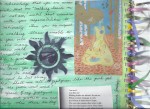 “Women with clean houses do not have finished books.” ~Me
“Women with clean houses do not have finished books.” ~Me
There is a wonderful chapter in the classic writing text by Brenda Ueland titled “Why Women Who Do Too Much Housework Should Neglect It for Their Writing.” The title is enough to liberate me from the toils of the home but others may need a bit more convincing. Before I encourage you, male or female, to reduce the amount of housework you do so you have more writing time, I will qualify my remarks with saying that complete abandonment of the necessary tasks to keep a dwelling sanitary is not what I’m advocating. It’s a matter of accepting other people’s help.
Ueland’s chapter is in her inspirational book If You Want To Write, A Book About Art, Independence and Spirit first published in 1938. The copy I never let get too far away is a 1987 edition, and even though she was a turn-of-the-century woman, her advice is applicable to anyone who wants to write today. Her ideas have influenced my belief that everyone is a writer to some degree. Some take it farther than others. In this clever chapter, Ueland presents the work of former writing students from her classes and shows how as women they are quite talented writers but the demands of being mothers and wives seems to prohibit them from knowing the satisfaction of publication.
Online chats and luncheon table conversations at writing conferences never fail to spend some time bemoaning the fact that women have too many household responsibilities and civic chores to get any writing done. Whooey seems to be my word of choice this week, and I repeat it here. I homeschooled my two daughters for 18 years and published a non-fiction book, finished a historical romance novel, wrote weekly columns for three regional newspapers, published many poems, published book reviews online, and wrote 1-4 articles monthly for a trade magazine all while they were sitting at their desks beside me doing social studies and English. When it was time to focus on work where I couldn’t be interrupted, I made sure they were safely ensconced and closed the office door. The sign read “Do not disturb unless it’s bleeding, broken, or on fire. Love, Mommy.”
Ueland’s advice is similar: “If you would shut your door against the children for an hour a day and say: ‘Mother is working on her five-act tragedy in blank verse!’ you would be surprised how they would respect you. They would probably all become playwrights.”
What strikes me the most honestly about her comment is that my daughters reacted this very way to this very practice. My oldest called me this week to tell me she has arranged for me to speak to the undergraduate playwriting group in her college theatre department to talk about Writer Wellness and how it applies to their future careers as writers. I didn’t intentionally set out to raise more writers. Both daughters write really well. I set out to respect myself and model what a woman with a passion for something looks like so that when they find their passions they’ll know it.
If they grow up to be writers, I won’t be disappointed. I just hope I still have their rooms relatively “clean”. It’s a feast or famine career but one that even a mother can be proud of doing.
Of course, there’s the story where one day I heard the youngest child saying, “I don’t think Mommy likes matches,” and I flung the office door open pretty quickly.
There are five primary areas of practice to the Writer Wellness plan. Every other week I will post an idea for relaxation (Monday Meditation,) creative play (Tuesday Tickle,) fitness and exercise (Wednesday Workout,) journaling and misc. (Thursday Thought,) and nutrition (Friday Feast.)
Meanwhile, remember to look for a digital or print copy of Writer Wellness, A Writer’s Path to Health and Creativity at Who Dares Wins Publishing, http://whodareswinspublishing.com.
And check out these great blogs for ideas to keep your writing and publishing healthy and prosperous.
http://writeitforward.wordpress.com/ Bob Mayer
http://jenniholbrooktalty.wordpress.com/ Jenni Holbrook
http://warriorwriters.wordpress.com/ Kristen Lamb
http://inspiration4writers.blogspot.com/ Inspiration for Writers, Inc.
http://pentopublish.blogspot.com/ Natalie Markey
http://amyshojai.com Amy Shojai
Check out my new website Joy E. Held
Have you subscribed to this Writer Wellness blog yet? Get email updates when a new post is added. Click “subscribe” and leave your email. That’s it and thanks in advance!
Be well, write well














